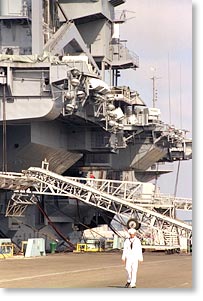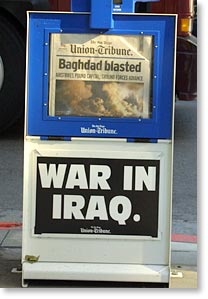|
No Oil For Blood:
A coalition of anti-war groups in Pakistan, where fast-foods are popular, launched a boycott against McDonald's and Kentucky Fried Chicken. In Australia, where tens of thousands of demonstrators brought Melbourne to a standstill, "Not-in-Our-Name" activists called for an international shutdown of U.S. business. One spokesperson said: "As the Anglo-American blitzkrieg is now under way, all those people worldwide who are opposed to the invasion have been asked to boycott all trade with the aggressor countries. Select products and services from countries that are in favor of peace." South African protesters in Cape Town called for a boycott of all American and British goods. Demonstrators also demanded that Denel, a South African contractor, cancel all contracts that supply military components to the U.K. and the U.S. Similar calls for economic action have been issued in Egypt, Belgium, Saudi Arabia, Indonesia, Thailand, Brazil, Chile, and the U.K. Targeting consumer-dependent industries and companies heavily involved in the military-industrial complex, South Africa Indymedia recently called on the world to "take aim at the only thing that can bring Bush to his knees: the American economy." Like Gandhi's historic boycott of British textiles, when the people of India manufactured their own clothing, today's boycotts are promoting creativity and self-reliance in the Mideast. Sales of Pepsi and Coca Cola are plummeting as Islamic nations create alternative cola drinks called Zam Zam and Mecca Cola. Local manufacturers cannot keep pace with the demand from Saudi Arabia and other Gulf states. Mecca Colas have already turned up in Britain. Recently peace groups distributed 36,000 bottles of Mecca Cola at Hyde Park in London. The Iranian government has banned ads for U.S.-manufactured goods. No Oil for Blood: The post-war boycott begins
"Fermiamo La Guerre," a huge coalition of peace groups in Italy, has called for a boycott of "American interests," targeting corporations that stand to gain from the war. The boycott began against Esso (Exxon in the U.S.) and will be extended to other oil companies -- Mobil, Chevron, and Texaco. Greenpeace has already launched a boycott against Exxon-Esso and Mobil. The economic boycott is based on the view that U.S. and Britain should be denied the spoils of war. Bechtel, a corporate Goliath that did business with Saddam Hussein when he was committing war crimes against Iranians and Iraqis, recently accepted a contract for the post-war reconstruction. As a result, Bechtel became the object of militant demonstrations at its headquarters in San Francisco. Since imperialism -- an economic system of world domination -- is the main source of violence and terror in the world today, anti-war boycotts are, by their very nature, anti-imperialist. That is why the emerging international boycott will endure long after the war ends. In a post-war situation, a boycott is one of the ways to punish the war profiteers for their crimes against peace and humanity. The Power of Boycotts In combination with demonstrations, mass education, and civil disobedience, boycotts can change the world. The American revolution began with a boycott -- the Boston Tea Party. The non-violent movement that brought down the British empire, included Gandhi's boycott against British textiles. The Montgomery Bus boycott launched the civil rights movement. Led by Cesar Chavez, the United Farm Workers were unionized through arduous national boycotts of lettuce and grapes. The burgeoning international boycott against U.S. imperialism, against the corporations preparing to feast on the spoils of war, may well match the scope of the historic boycott of South African apartheid. In fact the current anti-war boycott is a continuation of the worldwide struggle against Anglo domination and white supremacy. The end of the war will be a turning point for the peace movement. Emotions rise and fall. Unless the peace movement finds creative, economic ways to punish the war profiteers, feelings of helplessness and despondency may prevail. The U.S. will consolidate one conquest and prepare for another.
The international boycott puts the people of the world, not shaky governments, not wavering officials influenced by U.S. bribes and blackmail, in the forefront of peace and disarmament. A boycott can become an early form of economic empowerment. CEOs who treat world opinion with contempt go berserk when their sacred profits shrink. Erupting like dormant volcanoes, the world's boycotts are still spontaneous and have yet to be coordinated on an international scale. The current boycott is a grassroots movement, and the targets and strategies are diverse. Some groups refuse to purchase any U.S. and British goods. Others target the companies that profit from conquest and war. All over the world, symbols of U.S. culture are under attack: Coca Cola, Starbucks, McDonald's, the big oil companies. Leaders of the peace movement already realize that, in absence of economic action, it may be impossible to reverse the march of empire. It is naive to believe that the most violent system on earth, a country that exports more weapons than all countries combined, whose arms merchants profit from death and human suffering, will change its profitable and bellicose ways without strong economic pressure.
In the midst of the hardship of the Montgomery Bus boycott against U.S. segregation, when the days of civil rights were still dark, Dr. King said: "The arc of the universe is long, but bends toward justice." Time is on the side of the people. Let the boycott begin. |
||||||||||||||||||||||||||||||||||||||||||||||||||||||||||||||||||||||||||||||||
|
Paul Rockwell is a writer in the Bay Area rockyspad@earthlink.net Published in In Motion Magazine March 30, 2003. Also read:
|
||||||||||||||||||||||||||||||||||||||||||||||||||||||||||||||||||||||||||||||||
If you have any thoughts on this or would like to contribute to an ongoing discussion in the  What is New? || Affirmative Action || Art Changes || Autonomy: Chiapas - California || Community Images || Education Rights || E-mail, Opinions and Discussion || En español || Essays from Ireland || Global Eyes || Healthcare || Human Rights/Civil Rights || Piri Thomas || Photo of the Week || QA: Interviews || Region || Rural America || Search || Donate || To be notified of new articles || Survey || In Motion Magazine's Store || In Motion Magazine Staff || In Unity Book of Photos || Links Around The World NPC Productions Copyright © 1995-2020 NPC Productions as a compilation. All Rights Reserved. |
||||||||||||||||||||||||||||||||||||||||||||||||||||||||||||||||||||||||||||||||





